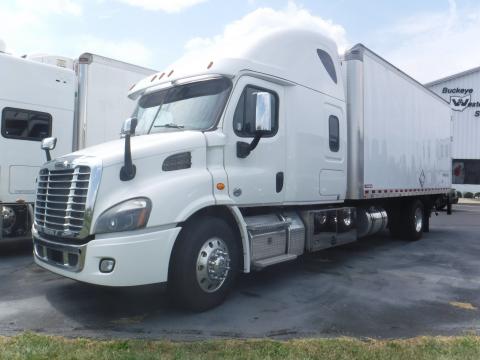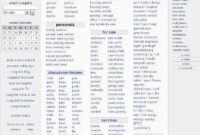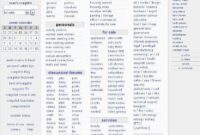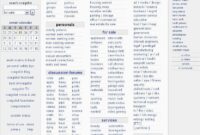Expedite Box Trucks For Sale: Your Comprehensive Guide to Entering the Fast Lane of Logistics pickup.truckstrend.com
In the dynamic world of logistics and transportation, time is money. Businesses constantly seek faster, more reliable solutions for their urgent freight, and this demand has carved out a lucrative niche: expedite trucking. At the heart of this rapid response industry lies the expedite box truck. Far more than just a vehicle, an expedite box truck is a mobile business hub, a key to unlocking independence, flexibility, and significant earning potential for owner-operators and small fleet owners.
This comprehensive guide delves into everything you need to know about expedite box trucks for sale, from understanding their vital role in time-sensitive deliveries to the practicalities of purchasing, operating, and succeeding in this high-demand sector. Whether you’re a seasoned driver looking for a new venture or an aspiring entrepreneur eager to hit the road, understanding the nuances of these specialized vehicles is your first step towards navigating the fast lane of logistics.
Expedite Box Trucks For Sale: Your Comprehensive Guide to Entering the Fast Lane of Logistics
Understanding the Expedite Trucking Business Model
Expedite trucking is a specialized segment of the freight industry focused on time-critical, urgent, and often high-value shipments. Unlike traditional Less-Than-Truckload (LTL) or Full-Truckload (FTL) services that operate on scheduled routes, expedite services are on-demand, requiring immediate dispatch and direct delivery. This "just-in-time" delivery model is crucial for industries like automotive (parts for assembly lines), aerospace, medical supplies, high-tech components, and any business facing a potential shutdown due to a missing part or product.
Why is it profitable? The urgency of the freight commands premium rates. Shippers are willing to pay more for the guarantee of speed and reliability that expedite services provide. Expedite box trucks are perfectly suited for this model due to their:
- Maneuverability: Easier to navigate urban areas and industrial parks than semi-trucks.
- Cargo Capacity: Sufficient for a wide range of expedited freight, from pallets to specialized equipment.
- Speed: Designed for highway speeds and efficient long-distance travel.
- Versatility: Can handle diverse loads, often requiring liftgates for easy loading/unloading.

The owner-operator model thrives here, offering individuals the chance to run their own business, manage their schedules, and directly benefit from their hard work and commitment to prompt delivery.
Key Features and Specifications of Expedite Box Trucks
Not all box trucks are created equal when it comes to expediting. Specialized features enhance efficiency, comfort, and compliance for long-haul, time-sensitive operations.
- Vehicle Class (GVWR): This is paramount.
- Non-CDL (Class 3-5): Trucks with a Gross Vehicle Weight Rating (GVWR) typically under 26,000 lbs (e.g., Ford F-450/F-550, Ram 4500/5500 chassis with a box). These do not require a Commercial Driver’s License (CDL) for operation, making them accessible to a wider pool of drivers. They usually have box lengths from 16 to 22 feet.
- CDL (Class 6-7): Trucks with a GVWR over 26,000 lbs (e.g., Freightliner M2, Isuzu FTR, Hino 268) require a CDL. They offer greater cargo capacity, with box lengths ranging from 22 to 26 feet, and often heavier payloads.
- Box Size: Common lengths are 16, 20, 22, and 26 feet. The choice depends on the typical volume and weight of freight you anticipate hauling. A 22-foot box is often a good compromise for versatility.
- Liftgates: An indispensable feature for many expedite operations. Hydraulic liftgates (tuck-away or rail gates) significantly ease the loading and unloading of heavy or palletized freight, especially at locations without loading docks.
- Sleeping Compartments/Bunks: For long-haul expedite runs, a dedicated sleeper area (either integrated into the cab or a custom build behind the cab) is essential for driver comfort, compliance with Hours of Service (HOS) regulations, and maximizing productive driving time.
- Cargo Management Systems: E-track systems on the walls and floor, along with robust tie-downs and load bars, are crucial for securing freight and preventing damage during transit.
- Engine Type: Diesel engines are overwhelmingly preferred for their durability, fuel efficiency on long hauls, and higher torque, which is beneficial for heavy loads.
- Refrigeration Units (Reefers): While not standard, a refrigerated box (reefer unit) significantly expands earning potential by allowing the transport of temperature-sensitive goods like pharmaceuticals, food products, or certain chemicals. This is a premium service.
- Auxiliary Power Units (APUs): For climate control and powering electronics in the sleeper cab without idling the main engine, saving fuel and reducing wear.
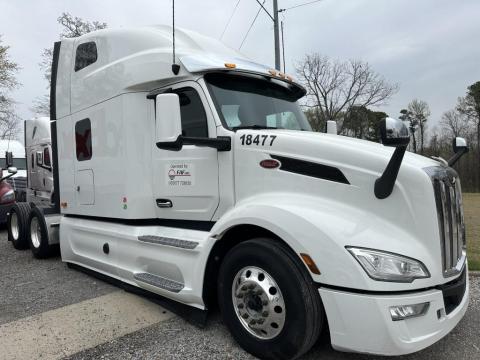
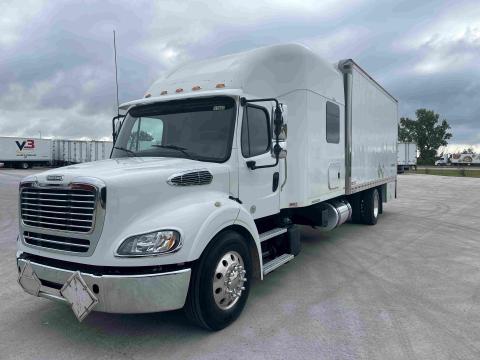
Benefits of Owning an Expedite Box Truck
The allure of expedite trucking is strong, and owning your own box truck offers distinct advantages:
- High Earning Potential: Expedite rates are significantly higher than standard freight rates due to the urgency and specialized nature of the service.
- Flexibility and Independence: As an owner-operator, you are your own boss. You choose which loads to take, when to drive, and where to go (within reason, based on freight availability).
- Lower Barrier to Entry: Compared to purchasing a semi-truck and trailer, the initial investment for an expedite box truck is generally lower, making it more accessible for new entrants.
- Consistent Demand: The need for rapid, reliable delivery is constant across various industries, ensuring a steady flow of potential work.
- Scalability: Starting with one truck, you can gradually expand your fleet as your business grows.
- Tax Advantages: Business ownership often comes with various tax deductions related to vehicle depreciation, fuel, maintenance, and other operating expenses.
Where to Find Expedite Box Trucks For Sale
Finding the right expedite box truck requires knowing where to look and being prepared to act.
- New Truck Dealerships: Major truck manufacturers (Freightliner, Isuzu, Hino, Ford, Ram, etc.) offer new chassis that can be custom-fitted with expedite boxes and sleepers by upfitters. This option provides full warranties, the latest technology, and customization.
- Used Truck Dealerships: A popular choice for budget-conscious buyers. Used truck dealers often have a wide selection of various makes and models. Look for dealers specializing in commercial or vocational trucks.
- Specialized Expedite Truck Dealers: Some dealerships specifically cater to the expedite market, understanding the unique needs of these vehicles (e.g., sleeper configuration, liftgates, APUs). They often have a curated inventory ready for expediting.
- Online Marketplaces: Websites like TruckPaper.com, CommercialTruckTrader.com, and eBay Motors are excellent resources for browsing a vast inventory of new and used box trucks from dealers and private sellers nationwide.
- Auctions: Public or commercial auctions (e.g., government surplus, bank repossession, fleet liquidation) can sometimes yield good deals, but require careful inspection as vehicles are sold "as-is."
- Direct from Owner-Operators/Fleets: Sometimes, an existing expedite owner-operator or small fleet owner might be selling their truck. This can be found through industry forums, Facebook groups, or word-of-mouth, often providing insights into the truck’s operational history.
Important Considerations When Buying an Expedite Box Truck
Purchasing an expedite box truck is a significant investment. Thorough due diligence is crucial to ensure you make a wise decision.
- New vs. Used:
- New: Higher upfront cost, full warranty, latest features, no unknown history. Best for long-term investment and peace of mind.
- Used: Lower upfront cost, quicker depreciation hit absorbed by previous owner, wider selection. Requires more diligent inspection and potentially higher immediate maintenance. A certified pre-owned program can offer some peace of mind for used vehicles.
- Budget and Financing: Determine your budget, including the down payment, and explore financing options. Commercial truck loans have different terms than personal auto loans. Lenders often look at your business plan and credit history.
- Vehicle Condition (Especially for Used):
- Mileage and Engine Hours: While high mileage is common for commercial trucks, look for a good maintenance history. Engine hours are more indicative of wear for trucks that idle frequently.
- Maintenance Records: Request detailed service records. This is the single best indicator of how well the truck was cared for.
- Rust and Frame Integrity: Inspect the chassis, frame rails, and suspension components for rust, cracks, or signs of accident damage.
- Tires, Brakes, Suspension: Check tire tread depth, brake pad wear, and the condition of springs, air bags, and shock absorbers.
- Liftgate Functionality: Test the liftgate multiple times to ensure smooth operation, no leaks, and proper weight capacity.
- Interior and Sleeper Condition: For long-haul, the sleeper area’s cleanliness, comfort, and functionality of amenities (heater, AC, power outlets) are critical.
- Pre-Purchase Inspection: Always have an independent, certified mechanic perform a thorough inspection, especially if buying from a private seller or auction.
- GVWR and CDL Requirements: Reiterate the importance of matching the truck’s GVWR to your license (or obtaining the necessary CDL). Operating an overweight vehicle without the proper license can lead to severe fines and penalties.
- Cargo Capacity Needs: Consider the typical dimensions and weight of the freight you aim to haul. Don’t buy a truck that’s too small for common expedite loads.
- Warranty: New trucks come with factory warranties. Some used trucks may offer limited warranties, especially if purchased through a certified dealer. Understand what is covered and for how long.
- Insurance: Commercial truck insurance is specialized and often more expensive than personal vehicle insurance. Get quotes early in your buying process.
- Operating and Maintenance Costs: Factor in ongoing expenses like fuel, oil changes, tire replacement, unexpected repairs, tolls, and parking when calculating your total cost of ownership.
Tips for Success in Expedite Trucking with a Box Truck
Once you’ve acquired your expedite box truck, success hinges on smart business practices and dedication.
- Network with Expediting Companies: Many expediting owner-operators contract with larger expedite carriers or freight brokers. Register with reputable companies that specialize in time-critical freight. Websites like Sylectus, DAT, and Truckstop.com offer load boards, but direct contracts can be more stable.
- Maintain Your Vehicle Rigorously: Preventative maintenance is paramount. Downtime due to breakdowns is lost income in expedite trucking. Follow manufacturer service schedules and address minor issues before they become major problems.
- Manage Your Finances Effectively: Track all income and expenses. Set aside funds for taxes, maintenance, and emergencies. A solid financial plan is key to long-term profitability.
- Understand Regulations: Stay current with DOT regulations, Hours of Service (HOS) rules, weight limits, and any state-specific requirements. Non-compliance can lead to hefty fines and business disruption.
- Excellent Communication and Customer Service: Expedite clients demand transparency and reliability. Communicate clearly and promptly with brokers, dispatchers, and shippers. Deliver on time, every time.
- Invest in Technology: A reliable ELD (Electronic Logging Device), GPS navigation optimized for commercial vehicles, a smartphone with good data, and communication apps are essential tools for efficiency and compliance.
- Be Ready to Go, Anywhere, Anytime: The nature of expedite trucking means you need to be prepared for spontaneous trips, potentially across state lines, at any hour. Flexibility is key.
Challenges and Solutions
While lucrative, expedite trucking has its challenges. Being prepared can help you overcome them.
- Irregular Work: Expedite freight can be unpredictable.
- Solution: Partner with multiple reputable carriers/brokers, use several load boards, and consider diversifying into niche services (e.g., hazmat, reefer) to broaden your opportunities.
- Downtime: Vehicle breakdowns or slow periods mean no income.
- Solution: Implement a strict preventative maintenance schedule. Build an emergency fund to cover repairs and living expenses during downtime.
- Fuel Costs: Volatile fuel prices can eat into profits.
- Solution: Optimize routes to minimize empty miles. Use fuel cards offering discounts. Practice fuel-efficient driving habits.
- Competition: The growing popularity of expedite trucking means more competition.
- Solution: Focus on providing exceptional service, build strong relationships with clients, and consider specializing in certain types of freight or regions where demand is high.
- Regulatory Compliance: Keeping up with ever-changing regulations can be daunting.
- Solution: Stay informed through industry associations, utilize reliable ELD providers, and consider professional help for compliance auditing if needed.
Expedite Box Trucks For Sale: Estimated Price Guide
Prices for expedite box trucks vary significantly based on age, mileage, condition, features, and make/model. The table below provides a general estimation.
| Category | Box Size (ft) | Year Range (Used) | Estimated Price Range (USD) | Key Features / Notes |
|---|---|---|---|---|
| Used Non-CDL | 16-22 | 2015-2022 | $35,000 – $80,000 | Often Ford F-450/550 or Ram 4500/5500 chassis. May or may not have an integrated sleeper. Look for liftgate. |
| Used CDL | 22-26 | 2015-2022 | $60,000 – $120,000 | Typically Freightliner M2, Hino, Isuzu. More likely to have full sleeper, liftgate, higher payload. |
| New Non-CDL | 16-22 | Current Year | $90,000 – $150,000+ | Brand new chassis with custom expedite box and sleeper upfit. Full factory warranty. |
| New CDL | 22-26 | Current Year | $130,000 – $250,000+ | New heavy-duty chassis, full custom expedite sleeper, potentially reefer option. High customization. |
| Reefer Equipped | 20-26 | Varies | +$20,000 – $50,000 | Adds significant cost, but opens up temperature-controlled freight opportunities. |
Note: These are general estimates. Prices can fluctuate based on market demand, specific configurations (e.g., APU, inverter, premium interior), and economic conditions.
Frequently Asked Questions (FAQ)
1. Do I need a CDL for an expedite box truck?
Not necessarily. If the truck’s Gross Vehicle Weight Rating (GVWR) is 26,000 lbs or less, you typically do not need a CDL. However, for trucks with a GVWR over 26,000 lbs (often larger 22-26 ft box trucks), a CDL is required. Always check the specific GVWR of the truck and your state’s regulations.
2. How much can I make with an expedite box truck?
Earnings vary widely based on factors like the number of miles driven, rates secured per mile, operating expenses, and efficiency. Many successful owner-operators report gross earnings ranging from $150,000 to $300,000+ annually, with net profits depending on expense management.
3. What’s the best mileage for a used expedite box truck?
For used box trucks, mileage alone isn’t the sole indicator. A truck with 300,000-500,000 miles that has been meticulously maintained can be a better buy than one with lower mileage but a poor service history. Look for comprehensive maintenance records.
4. What are the typical operating expenses?
Key expenses include fuel (often the largest), insurance, maintenance and repairs, tires, tolls, permits, ELD subscription, truck payments, and personal expenses while on the road.
5. How do I find loads for my expedite box truck?
The most common methods are contracting with expedite freight carriers (who dispatch loads to you), utilizing online load boards (like DAT Solutions, Truckstop.com, Sylectus), and networking directly with freight brokers or shippers.
6. Is expedite trucking profitable?
Yes, expedite trucking can be highly profitable due to premium rates for time-critical freight. However, profitability depends on effective business management, consistent work, diligent expense control, and reliable vehicle operation.
7. What’s the difference between a straight truck and a box truck in expediting?
In the context of expediting, "straight truck" and "box truck" are often used interchangeably to refer to a single-unit truck where the cab and cargo area are on the same chassis, as opposed to a tractor-trailer combination. Both terms describe the type of vehicle commonly used for expedite services.
Conclusion
The market for expedite box trucks for sale represents a robust gateway into a thriving segment of the transportation industry. For individuals seeking autonomy, high earning potential, and the satisfaction of delivering critical freight, an expedite box truck is more than just a vehicle – it’s a mobile business asset. Success in this field demands careful planning, a keen understanding of the market, a commitment to rigorous vehicle maintenance, and unwavering dedication to customer service.
By thoroughly researching your options, conducting due diligence on any potential purchase, and preparing yourself for the unique demands of time-sensitive logistics, you can confidently embark on a rewarding journey as an expedite owner-operator. The road ahead is challenging, but with the right expedite box truck and a solid business strategy, it can also be incredibly profitable and fulfilling.
